LI Network
Published on: 12 September 2023 at 19:21 IST
The Calcutta High Court has emphasized the significance of Article 215 of the Constitution in granting High Courts the authority to review their judgments.
This ruling clarifies that Article 215 designates High Courts as “Courts of records,” endowing them with inherent powers to rectify records.
This authority extends beyond mere record-keeping, as High Courts have a responsibility to maintain accurate records within their jurisdiction in accordance with the law.
The case under consideration revolved around the distinction between review and recall of an order, as well as the prerequisites outlined in Order XLVII Rule 1 of the Code of Civil Procedure (CPC) for permitting a review application.
The Calcutta High Court maintained that High Courts, being Courts of records, are not bound by the limitations of the 1996 Act or the strictures of Order XLVII Rule 1 of CPC when exercising their plenary powers during the application review stage.
Justice Moushumi Bhattacharya, presiding over a Single Judge Bench, stated, “Article 215 can be invoked to exercise the power of reviewing the judgment passed by this Court on June 26, 2023.
The High Court, in the exercise of its plenary powers, cannot be constrained by the limitations of the 1996 Act concerning reviews or hindered by the restrictions of Order XLVII Rule 1 of The Code of Civil Procedure when admitting the application.”
The case revolved around a review application concerning a judgment dated June 26, 2023, which had allowed the appointment of an arbitrator under section 11 of the Arbitration and Conciliation Act, 1996.
The Respondent argued that new and crucial evidence had come to light, not within their knowledge at the time of the judgment’s delivery, and despite diligent efforts, could not have been presented earlier.
The Respondent contended that the 1996 Act did not contain provisions for the review of orders issued by a Court under the Act, including those under section 11.
In response, the Bench referred to the precedent set in the case of M.M. Thomas v. State of Kerala (2000), wherein the Supreme Court affirmed that the High Court, as envisioned in Article 215 of the Constitution, is a Court of records and possesses inherent powers to correct records.
The Bench also cited the case of Municipal Corporation of Greater Mumbai v. Pratibha Industries Limited (2019), where the Supreme Court declared that Article 226 does not preclude High Courts from exercising the power of review inherent in every Court with plenary jurisdiction. This power exists to prevent miscarriages of justice and correct glaring errors.
Ultimately, the Bench upheld the maintainability of the review application, emphasizing that the authority to correct orders, even in cases with apparent errors on the record, falls within the High Court’s plenary powers as a Court of record.
Case Title: Radha Bhattad v. Rashmi Cement Limited

